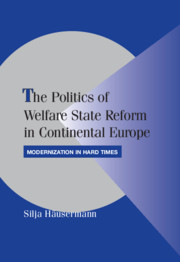Book contents
- Frontmatter
- Contents
- List of Figures
- List of Tables
- Preface
- The Politics of Welfare State Reform in Continental Europe
- 1 “EPPUR SI MUOVE”: WELFARE STATE CHANGE DESPITE INSTITUTIONAL INERTIA
- 2 MODERNIZATION IN HARD TIMES: THE POST-INDUSTRIAL POLITICS OF CONTINENTAL WELFARE STATE REFORM
- Part I Pension Reform in Continental Europe: A Framework of Analysis
- Part II Determinants of Successful Pension Reform in Continental Europe
- 6 FRANCE: TRADE UNION FRAGMENTATION AS AN OPPORTUNITY FOR REFORM
- 7 GERMANY: INSTITUTIONAL OBSTACLES TO MULTIDIMENSIONAL REFORM POLITICS
- 8 SWITZERLAND: RECALIBRATION AS AN ENABLING MECHANISM OF PENSION COMPROMISES
- 9 CONCLUSION: REFORM OUTPUTS AND POLITICAL IMPLICATIONS
- Appendices
- References
- Index
- Cambridge Studies in Comparative Politics
9 - CONCLUSION: REFORM OUTPUTS AND POLITICAL IMPLICATIONS
Published online by Cambridge University Press: 06 July 2010
- Frontmatter
- Contents
- List of Figures
- List of Tables
- Preface
- The Politics of Welfare State Reform in Continental Europe
- 1 “EPPUR SI MUOVE”: WELFARE STATE CHANGE DESPITE INSTITUTIONAL INERTIA
- 2 MODERNIZATION IN HARD TIMES: THE POST-INDUSTRIAL POLITICS OF CONTINENTAL WELFARE STATE REFORM
- Part I Pension Reform in Continental Europe: A Framework of Analysis
- Part II Determinants of Successful Pension Reform in Continental Europe
- 6 FRANCE: TRADE UNION FRAGMENTATION AS AN OPPORTUNITY FOR REFORM
- 7 GERMANY: INSTITUTIONAL OBSTACLES TO MULTIDIMENSIONAL REFORM POLITICS
- 8 SWITZERLAND: RECALIBRATION AS AN ENABLING MECHANISM OF PENSION COMPROMISES
- 9 CONCLUSION: REFORM OUTPUTS AND POLITICAL IMPLICATIONS
- Appendices
- References
- Index
- Cambridge Studies in Comparative Politics
Summary
Over the past thirty years, the pension regimes of France, Germany, and Switzerland have undergone major transformations. What makes these ongoing transformations paradigmatic is not only a dramatic change in the benefit levels, though one may certainly call the changes transformative if measured by the scope of the cutbacks (Organisation for Economic Co-operation and Development 2007). Moreover, however, these reforms are transformative because they have changed the very structure of these continental pension schemes in two ways. First, there is increasing differentiation of the instruments of old-age income protection, with different policies focusing on different income and risk groups. France and Germany have started to complement or replace part of their basic insurance schemes with tax-financed minimum-income security for the least privileged and with new capitalized pension savings opportunities for the more privileged. In this fashion, their pension regimes have become more redistributive at the lower end of income distribution and increasingly Bismarckian (i.e., earnings-related and inegalitarian) at the upper end. A similar multitiered system has developed in Switzerland since the 1970s. It combines basic public income insurance with means-tested supplementary benefits, on the one hand, and private and occupational pension privileges for high-skilled and high-income earners on the other hand. The second transformative change is that all three countries' reforms have started to shift the regimes away from a male-breadwinner model, reducing the dependency of – mostly female – outsiders on the pension rights of insiders.
- Type
- Chapter
- Information
- The Politics of Welfare State Reform in Continental EuropeModernization in Hard Times, pp. 196 - 218Publisher: Cambridge University PressPrint publication year: 2010



